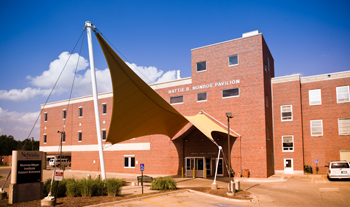People who analyze genetic diseases – clinical cytogeneticists and clinical geneticists — are in short supply.
To address this problem, UNMC’s Munroe-Meyer Institute has started two-year fellowship programs to train health care professionals for these fields. The programs are certified by the American Board of Medical Geneticists, a branch of the American Medical Association.
 |
The Munroe-Meyer Institute has started two new fellowship programs to help train genetics professionals. |
MMI’s eight board certified doctoral geneticists, eight genetic counselors and 65 lab and other genetics professionals struggle to keep up with the demand, Dr. Sanger said.
UNMC provides the majority of genetics services for Nebraska and portions of several surrounding states, as well as consultations and lab diagnostic studies nationally and internationally.
Two physicians began the fellowship program in clinical genetics on July 1. Lois Starr, M.D., and Eric Rush, M.D., just completed their residencies at UNMC in pediatrics and internal medicine/pediatrics, respectively. After this initial year, MMI will admit just one clinical genetics fellow per year.
|
MMI also will reinstitute its fellowship in clinical cytogenetics, one of 45 in the nation, within the year. MMI discontinued the fellowship 12 years ago due to limited staff and increased requirements, Dr. Sanger said.
“We’re starting up again because of the need,” he said.
Accepting one applicant a year, the cytogenetics fellowship will be open to geneticists with a doctorate degree and to physicians who have completed a residency in pediatrics, pathology, neurology, family practice or obstetrics.
Cytogeneticists detect chromosomal problems early to provide other health care professionals an opportunity to establish a method of treatment.